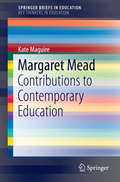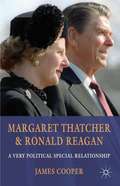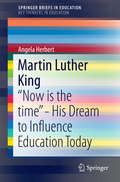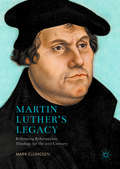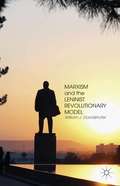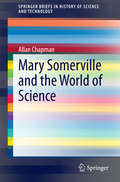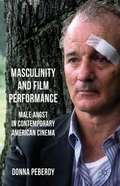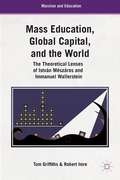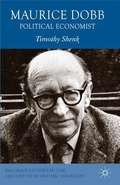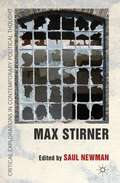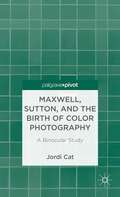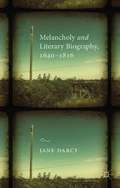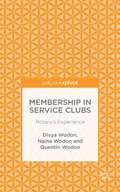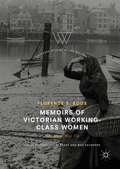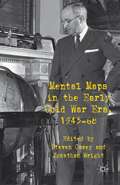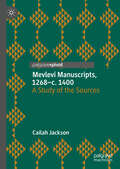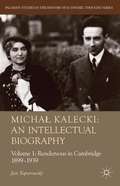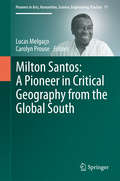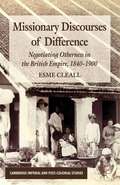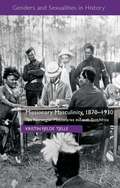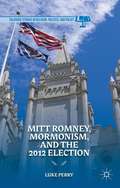- Table View
- List View
Margaret Mead
by Kate MaguireThis book makes a case for Margaret Mead's contributions to education discourses, which in retrospect appear visionary and profoundly democratic, non judgemental and transdisciplinary, and for their relevance for education today at primary, secondary and tertiary levels. Mead combined her substantial skills and knowledge as a linguist, anthropologist and psychologist to draw attention to the primary role of culture and society in identity formation, privileging against sterner perspectives, the idea that the conditions that support the emergence of balanced personalities, able to contribute to society and to progress themselves as individuals, starts with observation of self before that of others. This observation of and reflection on self was for her a necessary demonstration of transparency while close observation of others was 'an act of love', much as the artist contemplates his/her subject, that dissolved negative differences of culture, belief and status.
Margaret Paston’s Piety
by Joel T. RosenthalThe collection of Margaret Paston's letters and papers from fifteenth century England offeran invaluableexampleof daily life during that period. Drawing on a close reading of these personal letters, as well as Paston'swill, this book reveals how popular religion was integrated into daily life. "
Margaret Thatcher and Ronald Reagan
by James CooperA new exploration of the relationship between the Margaret Thatcher and Ronald Reagan administrations in domestic policy. Using recently released documentary material and extensive research interviews, James Cooper demonstrates how specific policy transfer between these 'political soul mates' was more limited than is typically assumed.
Martin Luther King
by Angela HerbertThis book explores the significance of Dr Martin Luther King Jr. 'I have a dream' speech and the continued legacy to education and academia demonstrated through the study of his life, achievements, works and ultimate assassination, which are included in social studies and history as part of the curriculum. There are lessons to be learned from his speech about access, success and progression to and from education at all levels. The influence of religion is a key feature that is manifested through social inclusion and tolerance which if considered from an academic perspective results in achievement. From peaceful demonstration and humble engagement with authorities, King made a mark that would be referenced 50 years later in all areas of academia from teaching young people about his life and achievements to equality, rights and tolerance, reflected throughout this book. The impact of prejudice, discrimination and segregation addressed by King's campaign which through adversity resulted in the passing of the Civil Rights Bill in the USA supported the non-political rights of all citizens is discussed. All of these concepts influence perception and realistic possibilities in the quest for people from all walks of society to access and benefit from education, which is explored. What motivated King to speak out and selflessly address the rights of the underprivileged, Black and White putting at risk his liberty and ultimately his life? King's speech is considered and associated with current issues faced by the people that are socially excluded. The struggle for social equality is considered with a focus on the impact of exclusion from education that demonstrates the need for a dream that gives hope to current and future generations that suggests that education can be accessed and lead to academic success.
Martin Luther's Legacy
by Mark EllingsenThis volume is a unique interpretation of what Martin Luther contributes to renewed appreciation of Biblical diversity. The Church in the West is struggling. One reason behind this is that the prevailing models for Theology have imposed logical and modern ways of thinking about faith that renders theology academic, and therefore largely irrelevant for daily life. By letting the first Reformer speak for himself in this book, Mark Ellingsen shows how Martin Luther's theological approach can reform the Church's theology today. The real Luther--not the one taught by his various systematic interpreters--presents Christian faith in its entirety, with all its rough edges, in such a way as to direct on how and when to employ those dimensions of the Biblical witness most appropriate for the situation in which we find ourselves.
Marxism and the Leninist Revolutionary Model
by William J. DavidshoferThis book explores Marxist and Leninist revolutionary theory. Topics include: the philosophical dialectic, historical materialism, the revolutionary movement, and Communist cadre political rule in the socialist state. Emphasis on Lenin's wartime political treatment of imperialism, national self-determination, and socialism in one country.
Mary I
by Sarah DuncanThis book explores the gender politics of the reign of Mary I of England from her coronation to her funeral and examines the ways in which the queen and her supporters used language, royal ceremonies, and images to bolster her right to rule and define her image as queen.
Mary Somerville and the World of Science
by Allan ChapmanMary Somerville (1780-1872), after whom Somerville College Oxford was named, was the first woman scientist to win an international reputation entirely in her own right, rather than through association with a scientific brother or father. She was active in astronomy, one of the most demanding areas of science of the day, and flourished in the unique British tradition of Grand Amateurs, who paid their own way and were not affiliated with any academic institution. Mary Somerville was to science what Jane Austen was to literature and Frances Trollope to travel writing. Allan Chapman's vivid account brings to light the story of an exceptional woman, whose achievements in a field dominated by men deserve to be very widely known.
Masculinity and Film Performance
by Donna PeberdyMasculinity and Film Performance is a lively and engaging study of the complex relationship between masculinity and performance on and off screen, focusing on the performance of 'male angst' in American film and popular culture during the 1990s and 2000s. Building on theories of film acting, masculinity, performance, and cultural studies, this book establishes a framework for studying screen masculinity and provides close analysis of a range of performers and performance styles. It also examines the specific social, cultural, historical and political contexts that have shaped and affected the performance of masculinity on screen, such as the aging of the baby boom and the launch of Viagra onto the marketplace, the 'Iron John' and 'Wild Man' phenomenon, and the racially marked fatherhood crisis. Drawing from an array of illuminating film and actor case studies, including Bill Murray, Tom Cruise, Michael Douglas, Will Smith, William H. Macy, Denzel Washington, Broken Flowers, Far From Heaven, Pleasantville, Magnolia, and Wonder Boys, Donna Peberdyoffers a significant contribution to the emerging field of screen performance studies. "
Mass Education, Global Capital, And The World
by Tom G. Griffiths Robert ImreBy presenting a series of intricate analyses of educational phenomena through the theoretical lenses offered by Immanuel Wallerstein and Istv#65533;n M#65533;sz#65533;ros, the book engages readers and helps them to critically analyze their own participation in the global economy, as citizens, policy-makers, and academics or teachers.
Maurice Dobb: Political Economist
by Timothy ShenkThis book explores the life of the man whom even his critics acknowledged was one of the world's most significant Communist economists. From his outpost at the University of Cambridge, where he was a protégé of John Maynard Keynes and mentor to students, Dobb made himself into one of British communism's premier intellectuals.
Max Stirner
by Saul NewmanMax Stirner was one of the most important and seminal thinkers of the mid-nineteenth century. He exposed the religiosity behind secular humanism and rationalism, and the domination of the individual behind liberal modes of politics. This edited collection explores Stirner's radical and contemporary importance as a political theorist.
Maxwell, Sutton and the Birth of Color Photography: A Binocular Study
by Jordi CatThis focused and incisive study reassesses the historic collaboration between James Clerk Maxwell and Thomas Sutton. It reveals that Maxwell and Sutton were closer to true partners than has commonly been assumed, and shows how their experiments illuminate the role of technology, representation, and participation in Maxwell's natural philosophy.
Melancholy and Literary Biography, 1640–1816
by Jane DarcyThis book traces the development of literary biography in the eighteenth century; how writers' melancholy was probed to explore the inner life. Case studies of a number of significant authors reveal the 1790s as a time of biographical experimentation. Reaction against philosophical biography led to a nineteenth-century taste for romanticized lives.
Membership in Service Clubs: Rotary’s Experience
by Quentin Wodon Divya Wodon Naina WodonMembership in Service Clubs provides the first rigorous assessment of the activities of Rotary, a global service organization founded in 1905 that implements projects and helps build goodwill and peace throughout the world.
Memoirs of Victorian Working-Class Women
by Florence S. BoosThis volume is the first to identify a significant body of life narratives by working-class women and to demonstrate their inherent literary significance. Placing each memoir within its generic, historical, and biographical context, this book traces the shifts in such writings over time, examines the circumstances which enabled working-class women authors to publish their life stories, and places these memoirs within a wider autobiographical tradition. Additionally, Memoirs of Victorian Working-Class Women enables readers to appreciate the clear-sightedness, directness, and poignancy of these works.
Mental Maps in the Early Cold War Era, 1945-1968
by Jonathan Wright Steven CaseyThe early Cold War was a period of dramatic change. New superpowers emerged, the European powers were eclipsed, colonial empires tottered. Political leaders everywhere had to make immense adjustments. This volume explores their hopes and fears, their sense of their place in the world and of the constraints under which they laboured.
Metaphors in International Relations Theory
by Michael P. MarksMetaphors constitute a fundamental way in which humans understand the world around them. This book offers a comprehensive analysis of metaphors in theories of international relations. Until recently, conscious attention to metaphors in theories of international relations has been haphazard and sporadic. This book examines the metaphors that inform the major paradigms in international relations theory. Readers will discover that the vast majority of the terminology cataloguing, defining, and naming theories, concepts, and analytical tools pertaining to the study of international relations are metaphorical in nature. The book concludes that metaphors are an essential element in all aspects of international relations theory.
Mevlevi Manuscripts, 1268–c. 1400: A Study of the Sources
by Cailah JacksonThis book provides a detailed and carefully researched catalogue of over 140 manuscripts related to the Mevlevi Sufis in their formative period during the thirteenth and fourteenth centuries. It also offers an in-depth and rigorous analysis of the manuscript material, which reveals much about the role of manuscripts in early Mevlevi life, the identity of disciples who were scribes and manuscript owners, and the geographical spread of the Sufi group. The Mevlevi Sufis were one of the most important and prominent socio-religious groups to emerge in late medieval Anatolia, following the Mongol conquests of the 1240s. Sometimes known colloquially as the ‘whirling dervishes,’ the Mevlevis became particularly powerful under Ottoman rule in the early modern period, even counting some sultans as their disciples. However, there is still much to learn about their earliest days, following the death of their ‘patron saint’ Jalal al-Din Rumi in 1273. Rumi is of course also notable as the authorof the Masnavi, an extensive work of Sufi poetry written in rhyming couplets that is the core of Mevlevi ritual and learning. Beyond Mevlevi circles, Rumi remains very popular today as a ‘mystic’ poet. This study sheds new light on the intellectual culture of his time.
Michał Kalecki, An Intellectual Biography: Volume 1, Rendezvous in Cambridge 1899–1939 (Palgrave Studies in the History of Economic Thought)
by Jan ToporowskiThis volume of intellectual biography takes the Polish economist Micha Kalecki (1899-1970) from the shattering of his prosperous childhood, in Tsarist Łódź in the 1905 Revolution, to Cambridge and the failure of his co-operative research with John Maynard Keynes's supporters in Cambridge.
Militant Publics in India
by Arafaat A. ValianiAn historically informed ethnographic study of conceptions, arenas, and practices of physical training and militancy in the context of religious nationalism intwentieth-and twenty-first-century western India. Arafaat A. Valiani offers readers a telling glimpse and a rare insider perspective of the social world in which militants are made, explaining how group physical training and technico-ethical experimentswith ithave created a powerful religious nationalist movement in the Indian state of Gujarat that has been held responsible for carrying outmassive episodes of ethnic cleansing against Indian minorities. Aclose reading of Mohandas Gandhi's writing on popular mobilization and resistance and a detailed historical investigation of hitherto understudied episodes of "satyagraha" (Gandhi's celebrated concept of non-violence), this work illuminates debates on politics in South Asian history, anthropology, and sociology. Valiani interprets his own direct observation of Hindu nationalist pogroms in contemporary Gujarat, in addition to testimonies and ethnographic observations of the inner workings of the movement discovered by the author when he immersed himselfas a "trainee" within it. "
Milton Santos: A Pioneer in Critical Geography from the Global South
by Lucas Melgaço Carolyn ProuseFor decades, Milton Santos (1926-2001) has been considered one of the most influential thinkers in Brazilian and Latin American social sciences and geography. Yet his writings, most of which have not been translated into English, are largely unknown to European and North American audiences. This book introduces English-speaking scholars to Professor Santos through critical engagement with his ideas and writings. The chapters presented here reveal the breadth and originality of his critical thought, as well as its ongoing importance to contemporary debates. The book features a biography of Santos and includes an annotated translation of one of his most-cited texts, The Return of the Territory, offered here for the first time in English. This text demonstrates how Santos's provocative insights continue to transform core concepts of political and human geography. The book also includes a number of short chapters written by scholars from Brazil, Spain and France. Through reflections on Santos's work, the various authors demonstrate the value and possibilities of extending the geographer's theories. They explore key geographical themes across political economy, rural studies, territorial planning, environmental crisis, digital networks, indigenous peoples, transportation and public health. This collection invites geographers from around the world to engage with this rich intellectual tradition from Brazil.
Missionary Discourses of Difference
by Esme CleallMissionary Discourse examines missionary writings from India and southern Africa to explore colonial discourses about race, religion, gender and culture. The book is organised around three themes: family, sickness and violence, which were key areas of missionary concern, and important axes around which colonial difference was forged.
Missionary Masculinity, 1870–1930
by Kristin Fjelde TjelleWhat kind of men were missionaries? What kind of masculinity did they represent, in ideology as well as in practice? Presupposing masculinity to be a cluster of cultural ideas and social practices that change over time and space, and not a stable entity with a natural, inherent meaning, Kristin Fjelde Tjelle seeks to answer such questions.
Mitt Romney, Mormonism, And The 2012 Election
by Luke PerryThis book seeks to address the question of how we should understand the impact of Mitt Romney's faith in the 2012 election. As the first Mormon to earn a presidential nomination from a major party, the book provides a comprehensive study of Romney's historic candidacy.
